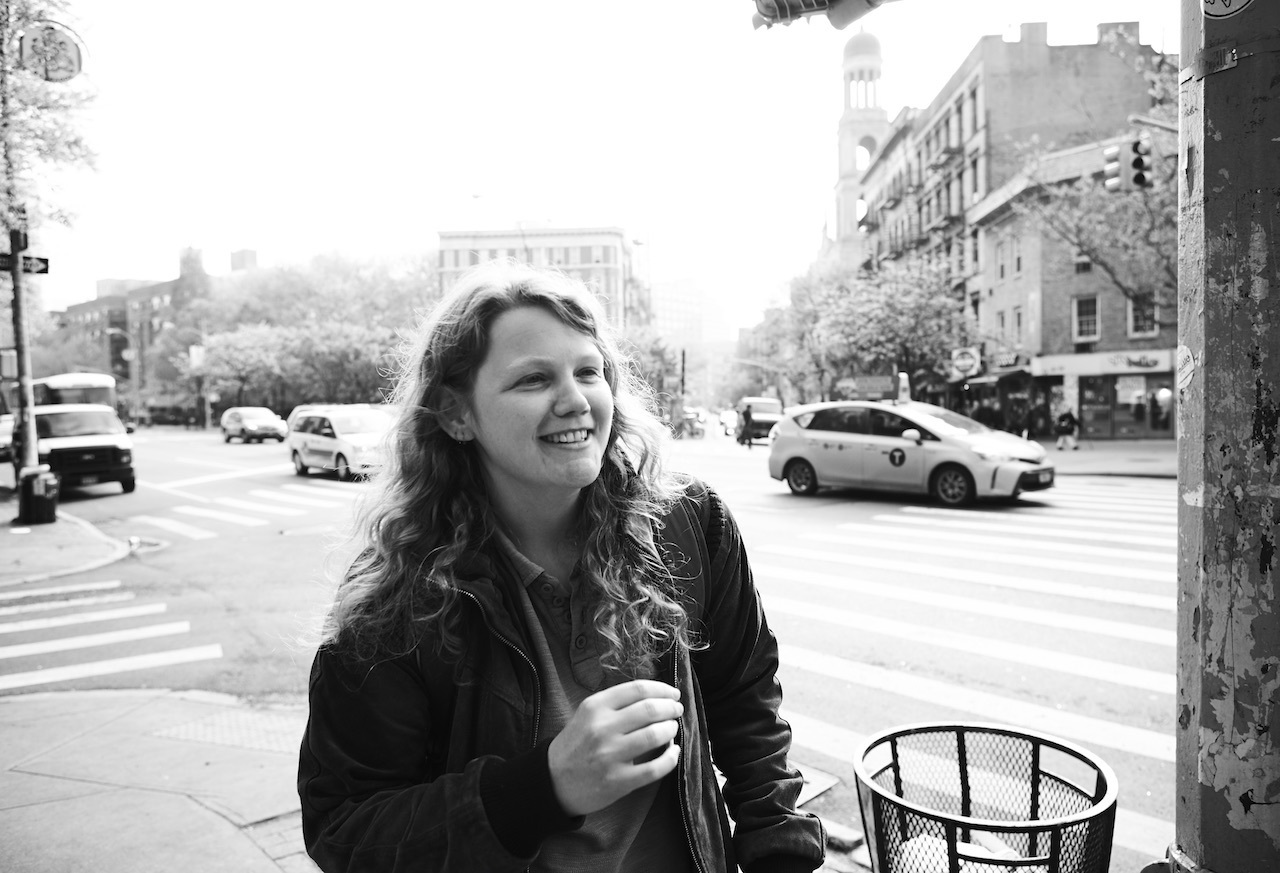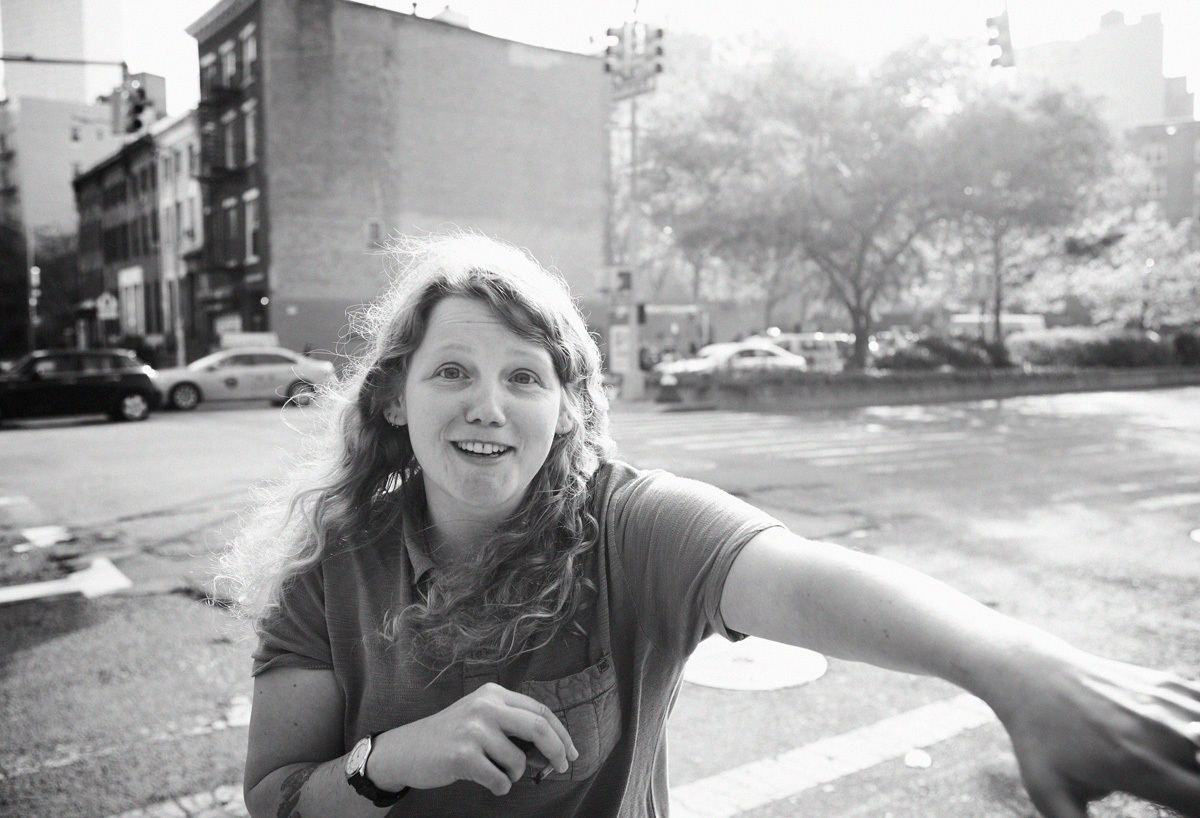Growing up in Brockley, South East London, 31-year-old Kate Tempest began writing stories as a child and later began to apply herself seriously to the medium as a teenager in writing music lyrics to rap. Since then, her impressive list of accolades are indicative of her boundless imagination; Mercury nominee musician, spoken word poet, author of two poetry collections and a novel, critically acclaimed playwright and winner of the inaugural Ted Hughes Award in 2013 for her collection Brand New Ancient.
Her latest record Let Them Eat Chaos is a sequential narrative that sees Kate rapping the lives of seven people, each unique in their characteristics but alike in their living on the same street in London, awake at the same specific hour of 4.18am. Kate’s love of Wu Tang Clan and London native William Blake are instrumental to the record, their influence heard in the hip-hop sound and the 48 minute stream of poetic verse. You can feel the generous dose of empathic observation she applies to paint such convincing portraits, from their internal perspectives to their response to social issues rife in an ever-changing yet often politically immovable city – Bradley feels like he’s ‘looking at the world behind a glass’ in Pictures on a Screen, Zoe packs away belongings in Perfect Coffee as a result of gentrification. Her approach to developing herself as a writer is as vast and open as the subject of human nature itself, a constant theme in all of Kate’s work whether that be a song, poem, play or book and who knows what next? Kate Tempest is limitless.
You’re a musician, poet, author and playwright. Has navigating all of these areas been a natural process for you?
The instincts to write and the desire is natural and everything else is work, you know. To try and accommodate an idea as best you can, I’ve found it’s very important to push yourself into unnatural spaces, into places where you don’t feel completely comfortable like for me, writing for theatre or fiction. All of it has helped me find my voice and somewhere between all of the struggles that you face in terms of trying to forge new pathways or work out how to exist in new spaces, that’s where progression towards finding your voice and feet creatively. That’s where I have found that to be a helpful way to move forward.
Do you remember the first time you felt compelled to channel your feelings and perspective in your writing?
It’s been a part of my life forever, there was no eureka moment. When I was a child I was writing stories and things like that, but I began to seriously apply myself to writing as a teenager when I began to write music lyrics when I was rapping.
Since smell is the closest link to memory out of all the senses, do you have any poignant memories from your childhood that can transport you back through a particular scent?
My next door neighbours were from Jamaica and there were lots of West Indian families on the street and I remember the smell of my neighbours cooking whose garden I used to play in because me and my mates used to play out on the streets when I was a kid. I remember the first time I went around there to eat with them when I was six or seven. There was a tree, an alleyway around the back of the houses that went up towards the park up the road, there were these particular trees and I remember that kind of heavy summer smell where everything is new and hot and green.

You paint such rich portraits of people with relatively few words – where do these characters come from?
It’s a combination of lived experience, self-experience and empathetic experience with other people’s lives. I think all characters have to begin in a moment of lived truth, that’s usually where they walk out from. There is something about writing characters that enables you to understand reality and your own feelings in a broader way. You get a clearer perspective on your own feelings if you can filter them through a character who isn’t you, who has nothing to do with you and who moves in different ways and lives in a different place. It’s definitely isn’t an autobiography, but it begins in truth and hopefully you can feel that in the work.
Do you feel you’ve always been emphatic?
Yeah. I think it begins in us at a very young age and it’s a huge part of how we live and survive but then it’s also a conscious decision, or at least it has been for me, to activate it more forcefully and to really try and live by it in a way that can be quite difficult. To really engage with your empathy if you feel yourself judging someone negatively or ignoring humanity in a day to day encounter with strangers – all of these things. The product of living in a huge city like London kind of grinds down your empathy and then it’s up to you to remember to active it.
You set the time for your album very specifically at 4:18am.
Yes. It’s as good as the founding principles as any in terms of when you’re collecting characters at any given moment. There’s something interesting about it being 4:18am because there’s the question of why are they awake at that time? It’s an interesting thing for a writer to begin with, the question of what are they doing and why are they awake? It programmes your brain to move down slightly different tracks than it would have if it had been say, midday. Also I feel very connected to that time of the morning, and I think that there’s something about being awake in the middle of the night people can relate to. Being trapped in that insomniac cyclical mode of thought and the isolation of that particular moment is a bit of a metaphor of how far away we are from ourselves and each other.

Where does the process of writing fiction begin for you?
All fiction begins in a moment of lived truth, some moment of truth, but that doesn’t necessarily mean a real situation, it just means a feeling. A feeling sparks it. You know how it feels to be wronged somehow and that brings to life a character, a moment of a feeling that you recognise. Fiction isn’t like documentaries, it’s just a response to life which is then largely employed in the imagination.
Who are are some authors you can re-read no matter what time or place you’re at in your life?
William Blake, James Joyce and Carsten McCulloch. Blake because he’s so rigorous and his writing is built on such a solid conception of a moral framework that there’s a certain amount you get from reading him that will only increase when you study him a bit deeper. Joyce because there’s so much in his work, so much simplicity and brevity despite the length of his writing and complexity and sometimes you can miss that. Formally what he was doing is so difficult to get your head around but as you grow up you understand it differently. Carsten because she writes people very well and when you read her you read at such a pace and rush that I find I can read her again and it feels new each time.
In what ways does the world make you conscious of its impact on your senses most of all?
If you’re a poet or writer or musician, the way that the world impacts on your senses is so full on that you have to write in order to understand what’s going on, to make sense of your senses. I feel like my sensitivities are so tuned into such an intense frequency, this is the reason I need to create. Especially for a woman on stage, your performance is all about your sensitivity and vulnerability and this is what enables you to be powerful on stage. I mean power in a kind of very honest and present way. I think that for a writer or a poet anyway, strength and sensitivity are the same thing because your sensitivity is why you write and that’s what makes you strong. Obviously music and spoken word are such a huge part of my world so I think poetry should all be spoken out loud to understand it, so in that sense what my ears do that my eyes miss is a very important part of my lyricism because I believe that your eyes will miss the shape and the sound of a word. You can read a poem on a page but you’ve missed half of it until you’ve spoken it in your mouth. The senses for me are very active, and creativity needs to be activated, it needs to involve your senses, it needs to be in your body for it to really come alive.
Credits
Text Sarah Roselle
